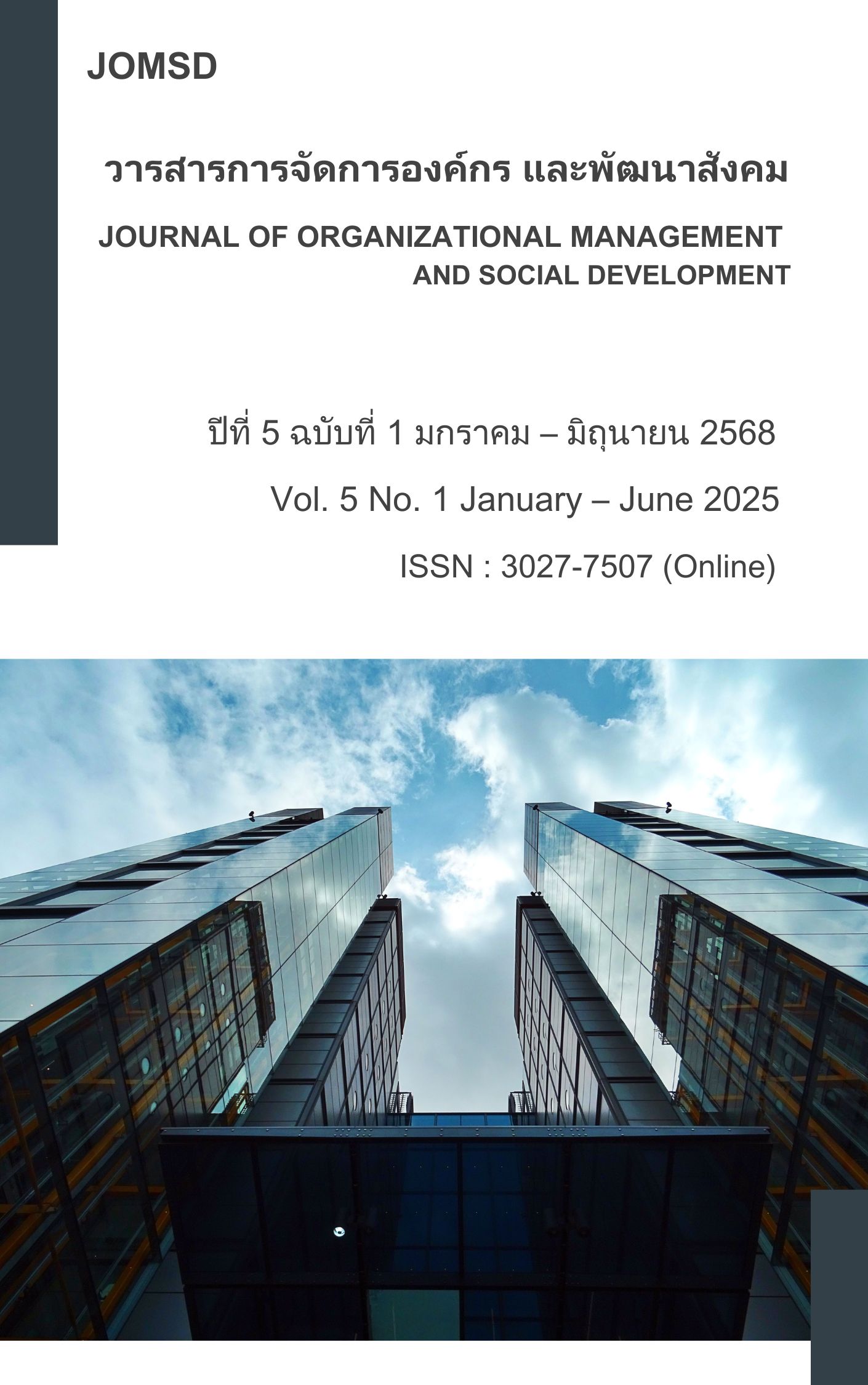Buddhist Integration for Promoting Social Equality Among Citizens by Administrators of Na Chaluai Sub District Municipality, Na Chaluai District, Ubon Ratchathani Province Based on the 6 Saraniyadhamma Principles
Main Article Content
Abstract
This article aims to 1) study the level of social equality provided to the public by the executives of Na Chaluai Subdistrict Municipality according to the 6 Saraniyadhamma Principles; 2) examine the relationship between the 6 Saraniyadhamma Principles and social equality provided to the public by the executives of Na Chaluai Subdistrict Municipality; and 3) present Buddhist integration to enhance social equality for the public by the executives of Na Chaluai Subdistrict Municipality in Na Chaluai District, Ubon Ratchathani Province, based on the 6 Saraniyadhamma Principles. This study employs a mixed-methods research approach. The sample group consists of citizens aged 18 and over in the Na Chaluai Subdistrict Municipality, with a stratified random sample of 380 people. Key informants include scholars in Buddhism, local governance, political science, and citizens in the Na Chaluai Subdistrict Municipality, totaling 12 individuals. The statistical analysis methods used include frequency, percentage, mean, standard deviation, and Pearson correlation coefficient. The research findings indicate that 1) the overall level of social equality provided to the public by the executives of Na Chaluai Subdistrict Municipality is high; 2) the relationship between the 6 Saraniyadhamma Principles and social equality for the public shows a significant positive correlation at the .01 level; and 3) Buddhist integration to enhance social equality for the public by the executives of Na Chaluai Subdistrict Municipality reveals that (1) it promotes participation in public activities; (2) it provides beneficial information to the public; (3) it organizes discussions on social equality; (4) it fosters awareness to accept and coexist; (5) it promotes respect and listening to reasoning; and (6) it opens opportunities for expressing opinions.
Article Details
References
จิตรกร ลออศรี. (2564). การสร้างจิตสำนึกทางการเมืองในระบอบประชาธิปไตยของเยาวชนในเทศบาลเมืองอโยธยา จังหวัดพระนครศรีอยุธยา. (รัฐศาสตรมหาบัณฑิต, มหาวิทยาลัยมหาจุฬาลงกรณราชวิทยาลัย).
เทศบาลตำบลนาจะหลวย. (2567). ข้อมูลเทศบาลตำบลนาจะหลวย. สืบค้นจาก https://nachaluay.go.th/basic-information/general-condition.
พระครูวินัยธรอธิษฐ์ สุวฑฺโฒ (สุขพานิช). (2564). การบูรณาการหลักพุทธธรรมเพื่อส่งเสริมวัฒนธรรมทางการเมือง ในระบอบประชาธิปไตยของประชาชนในจังหวัดเพชรบุรี. (ปรัชญาดุษฎีบัณฑิต, มหาวิทยาลัยมหาจุฬาลงกรณราชวิทยาลัย).
พระมหาประเสริฐ สุเมโธ (เพชรศรี) และปิยวัฒน์ คงทรัพย์. (2559). สาราณียธรรม : หลักธรรมในการแก้ปัญหาความขัดแย้งในสังคมไทย. วารสารวิจัยเพื่อพัฒนาสังคมและชุมชน มหาวิทยาลัยราชภัฏมหาสารคาม, 3(5), 24-29.
พัชราวลัย ศุภภะ, พระมหาประกาศิต สิริเมโธ และสัญญา สุดประเสริฐ. (2561). พุทธบูรณาการในการบริหารชุมชนเมืองแบบมีส่วนร่วมของ เทศบาลเมืองไร่ขิง จังหวัดนครปฐม. วารสารสันติศึกษาปริทรรศน์ มจร, 6(ฉบับพิเศษ), 453-463.
พิศมัย วงศ์จำปา และพระครูพิศาลสรกิจ. (2560). พลวัตภาคประชาชนกับการเคลื่อนไหวทางการเมืองในจังหวัดพะเยา (รายงานวิจัย). พระนครศรีอยุธยา: มหาวิทยาลัยมหาจุฬาลงกรณราชวิทยาลัย.
รัฐธรรมนูญแห่งราชอาณาจักรไทย พุทธศักราช 2560. (2560). สืบค้นจาก https://www.senate.go.th/assets/portals/13/files.pdf.
ราชกิจจานุเบกษา. (2542). ระเบียบสำนักนายกรัฐมนตรีว่าด้วยการสร้างระบบบริหารกิจการบ้านเมืองและสังคมที่ดี พ.ศ. 2542. (เล่มที่ 116. ตอนที่ 63 ง), 24.
สุรพล พรมกุล. (2554). ระเบียบวิจัยทางรัฐศาสตร์. กรุงเทพฯ: โอเดียนสโตร์.

